My Media Story: Sometimes, Journalists Should Stage a Walkout in Solidarity – Ámàká Okoyé, a Journalist on a Mission
Ámàká Okoyé is a moving ball on fire with spunk. Her energy, enthusiasm for life and her career is infectious as she touches everyone she meets, leaving you asking for more.
From covering the insurgency that began in the North East over a decade ago, which has taken on new dimensions, she takes us on a fast-paced media journey in a career that tells stories from across Nigeria, Africa, and to the rest of the world. A correspondent for DW, Deutsche Welle TV Germany, Ámàká Okoyé weaves a story like a thriller writer with a heart ❤️. In this Special Exclusive Interview with us at LightRay Media on the Nigerian Women in Media Project Series (#NWiMP), she takes us on her journey from her bushytail days to becoming an influential journalist of recon. Enjoy!
The Women in Media Project showcasing Nigeria Women in Media Series.
It’s such a pleasure to have this opportunity to have a sit-down interview with you, Àmáká Òkóyè.
Thank you very much, Lady E for the opportunity to talk about my career journey, I don’t take it for granted. I will like to first of all say that you are a star yourself and it takes another star to recognise one. Thanks for all the work you do also.
Ever seen a melanin turn pick? (we both go LOLl!) I’ve always found your energy, focus, humanity and love for what you do sweetly intoxicating. So, why don’t we start from the very beginning where all of this passion and fire come from and when was the first time you knew this was going to be your passion or career?
To be quite honest, I started off wanting to study Law and this came from the place of the last child and always arguing in every situation, it just felt like I have to argue everything. It is not that I don’t have a reason for everything at my disposal but there is just this tendency for last born to want to make a point, want to get things on a platter of gold. So every now and then, I find myself in fierce argument with my siblings and engaged intellectually into the thought of becoming a lawyer. I love the idea of just being called a lawyer or a barrister wearing the robes.
In fact, the first time I wrote JAMB, before I got a scholarship for my first degree, my first, second and third choices were all Civil Law. But life happened, I didn’t pursue that. I did not go for my first degree immediately, and when I was reflecting about my life, I thought that I wanted to be a lawyer for the sakes, and just for appearance sake, not that I would not make a good lawyer. I think I really, i wanted to be a civil lawyer, but then, I also realised talking and telling stories just came to me very naturally. When I experience something or when I want to put down something, I journal a lot and I listen to radio a lot.
My first contact to journalism was actually radio, BBC, focus on Africa and through Komla Dumor, God rest him, who was an icon of journalism because I love the way he tells stories and I felt that this is the way I also would tell stories. He told stories seamlessly with so much grace, he didn’t feel like he was acting, or working so hard to explain himself, he told you whatever story it is, if it’s a joyful one, you will feel it and if it is a sad one, you will see it through his expression. He just accompany story telling with so much clarity, grace, naturalness, he was just simple. For me, that was what caught my attention and I felt anytime I wanted to write anything, it just came to me. And I started writing script before I went to the school of journalism and that’s when I knew I will make a good story teller. And at that time, my brother was also studying journalism. In my family, we are four of us, we have two journalists or two in the practice of journalism, and two accountants.
My brother is more into academia, he is doing his doctorate to continue in lecturing. I’m not particularly into the academia, so I think I’m more cut out for the practicing aspect of journalism. So I started off in radio, like I said, Komla Dumor was an icon for me, though I could not reach him in person but I watched, listened to him and followed him. So I decided, when I changed my mind, when I get a scholarship that I was going to do Communications.
The course is actually called “Social Communication”, which is what we call Mass Communication in Nigeria, and my major was radio production, I did radio actually and in my school, you have a year to do all the three: print, radio and multimedia and in the second year, you specialise, so in my second year, I went for radio production. I workedd in a radio station in Isiolo, a semi area in the North of Kenya, that’s where I practised, but before then, I was already doing all sort of work for radio. I worked with Pan Africa Broadcasting Corporation, it’s now folded. But while in Radio Shahidi, I produced documentaries, I did features, I reported, I did jingles in English, Swahili and it was all kind of interesting. So, I think that at an early stage, I knew that this is my calling because it’s not just that I have flair, but I have the aptitude and I did it with so much ease, and I just thought that this is what I will love to do. And what you love to do, will be paying you as well. So, that was the first time I knew that journalism is for me.
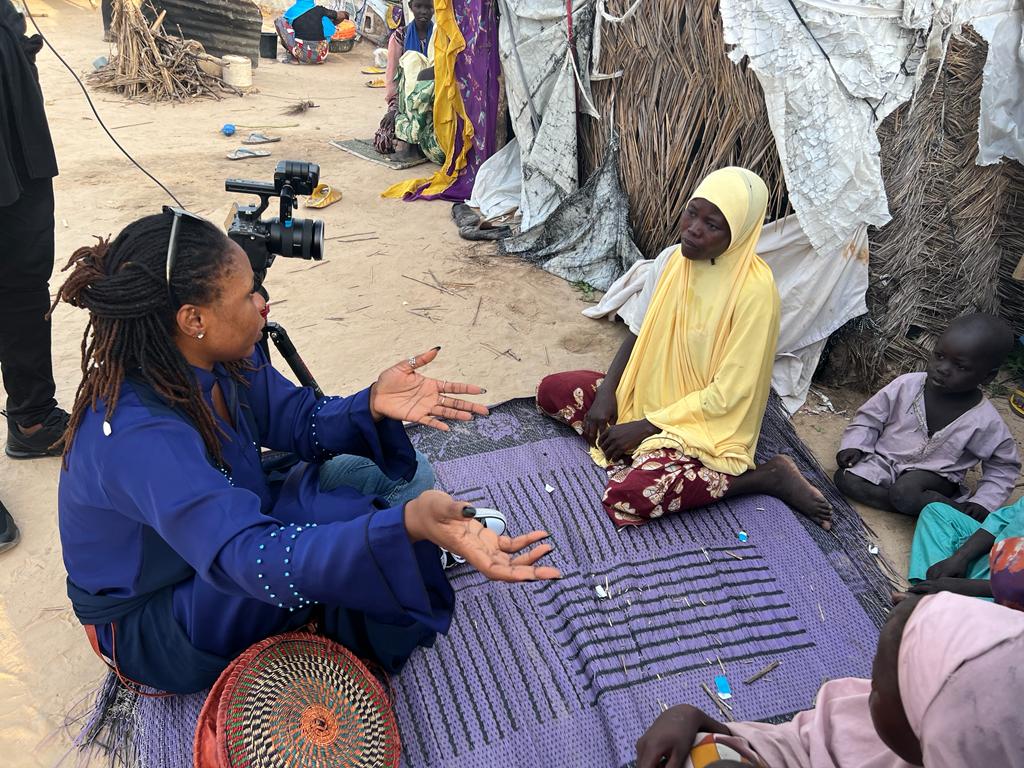
At what point did you feel your career was no longer just a job you showed up to?
I think this is a very crucial question, I never thought it was just a job I showed up for; and now I look back and see the sort of stories I have told, in Kenya, Ghana and in Nigeria, and I realised that there was a pattern to the stories that I told – it always has the human face on it and I think that was my drive. So when I returned to Nigeria, in my first employment, most of all the things that I did, all the documentaries I did-I did way over more than fifteen (15) documentaries, it has human face, it is either a story of a woman who is got a tumour, or I’m telling the story of a man unjustly incarcerated, sentenced to death but then got ten years and then got out of prison or I’m telling a story of three siblings who have a condition that nobody can tell what it is and they were wrongly diagonised and left them completely helpless, at the mercy of their parents carrying them and these people are in their thirties or I’m telling the story of someone at the slum either a guy who cannot walk and he decides to be a shoe maker which I told the story and then he got helped. It has always been the face of the human being or even when I went into Arise and I started covering conflicts more intensely, it’s never a job for me and I can say that my period in 2020 to the whole of 2021, I could count the number of times I slept in my house, I slept in more hotel rooms than I did in my house because I was always moving from a state to another state, there was this story to tell, there was this conflict to tell, there was this no-go area that someone needs to go and I just felt the need to go there.
I just felt for the sake of these people whom are now described by statistics and numbers, that their stories be told, to put these people in the front of state actors and non-state actors to realise that there is a need here and that must be told. I think that is what is still driving me to be perfectly honest, I have never felt that It is a job I showed up for. I feel like it’s a commitment, obligation, it’s weird, I feel it is something I have to do because it has to be done.
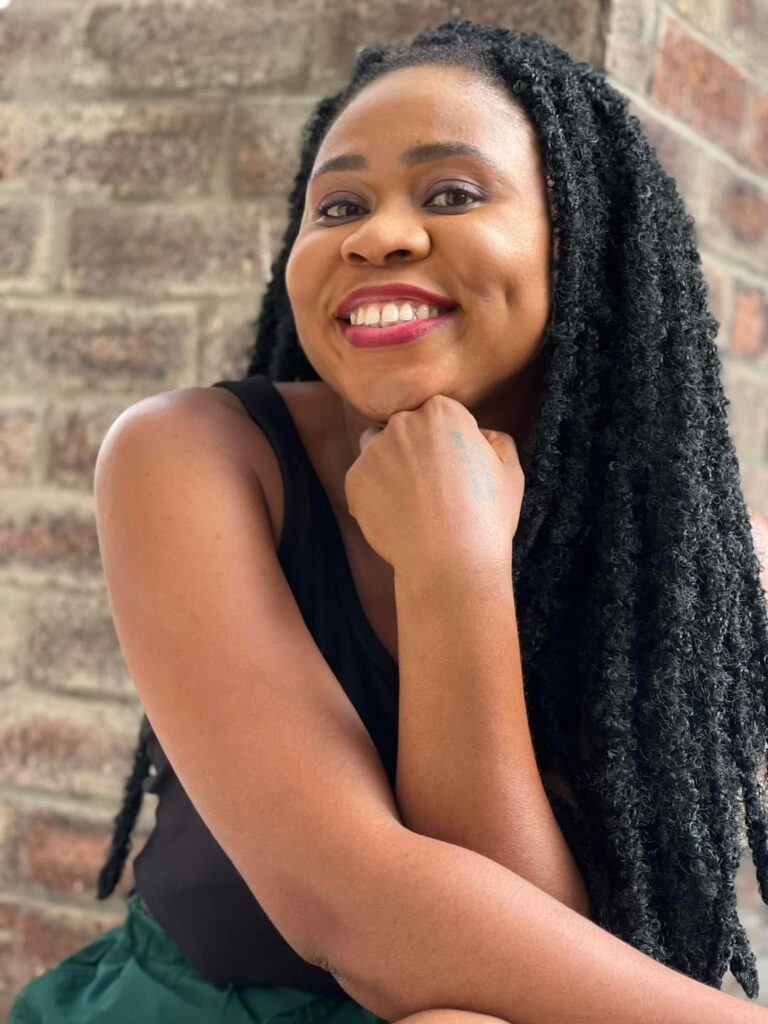
Amaka Okoye: “Another major challenge was convincing people that it is okay to be able to cover conflicts even as a woman, and once I broke through, it was now easy for them to trust my competence. I give thanks always to the MD of Arise at the time, Ijeoma Nwogwugwu who trusted my capacity and of course the chairman of Arise News, Prince Nduka Obaigbena who will call me directly and told me that you are going to Chibok, you are going to Zamfara, you are going to Kebbi and I would move and to my incredible cameraman, Ifeanyi.” PC: Okoye.
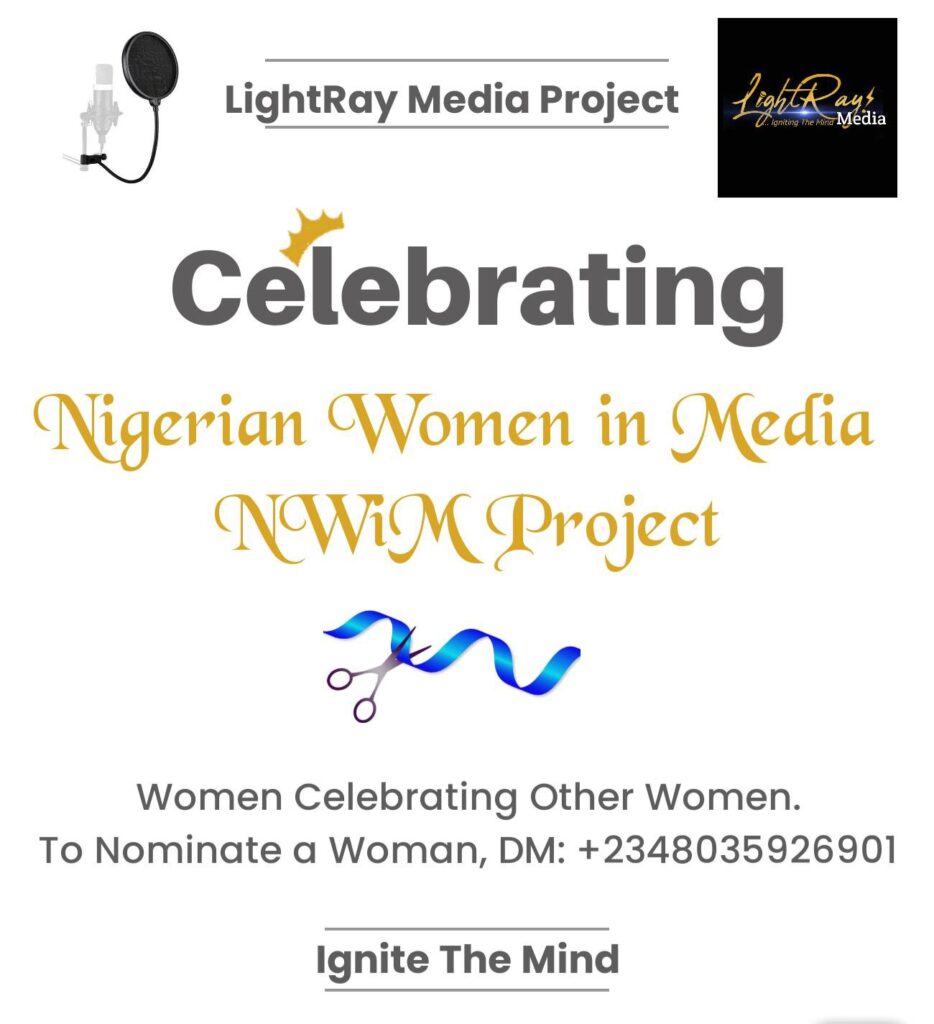
“There needs to be a lot of training on emotional intelligence in media organisations. Journalists must be comfortable, it’s not a luxury, and they need to be comfortable to do this job, I don’t know how else to express it but journalists should not be seen as haggard people. Journalists should be well paid, it should be a profession that people are envious of. Journalists are not meant to struggle if they want to go on vacation, you don’t think twice, ‘Oh my God! If I buy this ticket, I’m going to drink garri for the rest of the year.“
What were the struggles for you in the early stages of your career and how did you overcome them?
For me, the very first time I worked in Nigeria, I think it was the bureaucracy, it didn’t make sense to me when I came in, it was the fact that you had to fight a lot of “demons” to be able to tell a very good story, that was awkward for me.
The second part was convincing people that this story is worth telling especially when there was no money attached to it, it was a struggle for me. I think that my years of journalism practising in Nigeria and elsewhere are just very fulfilling for me because I told stories that were not money attached and that was why I made it clear when I came to Arise that I was not interested in covering events, it was not my thing, it was boring, as well as reading the news. I have great respect for anchors, the world will not hear the news if they are not there, but that’s not particularly my thing. I was grateful for the opportunity to have anchored the news both at Plus TV Africa and Arise Global News but that wasn’t my thing, my thing was to go to the place where it is happening.
Another major challenge was convincing people that it is okay to be able to cover conflicts even as a woman, and once I broke through, it was now easy for them to trust my competence. I give thanks always to the MD of Arise at the time, Ijeoma Nwogwugwu who trusted my capacity and of course the chairman of Arise News, Prince Nduka Obaigbena, who will call me directly and told me that you are going to Chibok, you are going to Zamfara, you are going to Kebbi and I would move and to my incredible cameraman, I consistently worked with one cameraman, I worked with one for the first story of abduction in Katsina, his name is Ugochuku Stanley, fantastic guy but more with Ifeanyi Godwin, who was consistently a great team player, in all the places I went, he was there with me and all the stories, we told them together. You see, we never get the chance to light the candle of our camerapersons, but anytime I talk about my successes, I don’t forget people like him, he went to all of those places, I mean he filmed those stories, If he didn’t, I could come back with absolutely nothing, so here is a shout out to him.
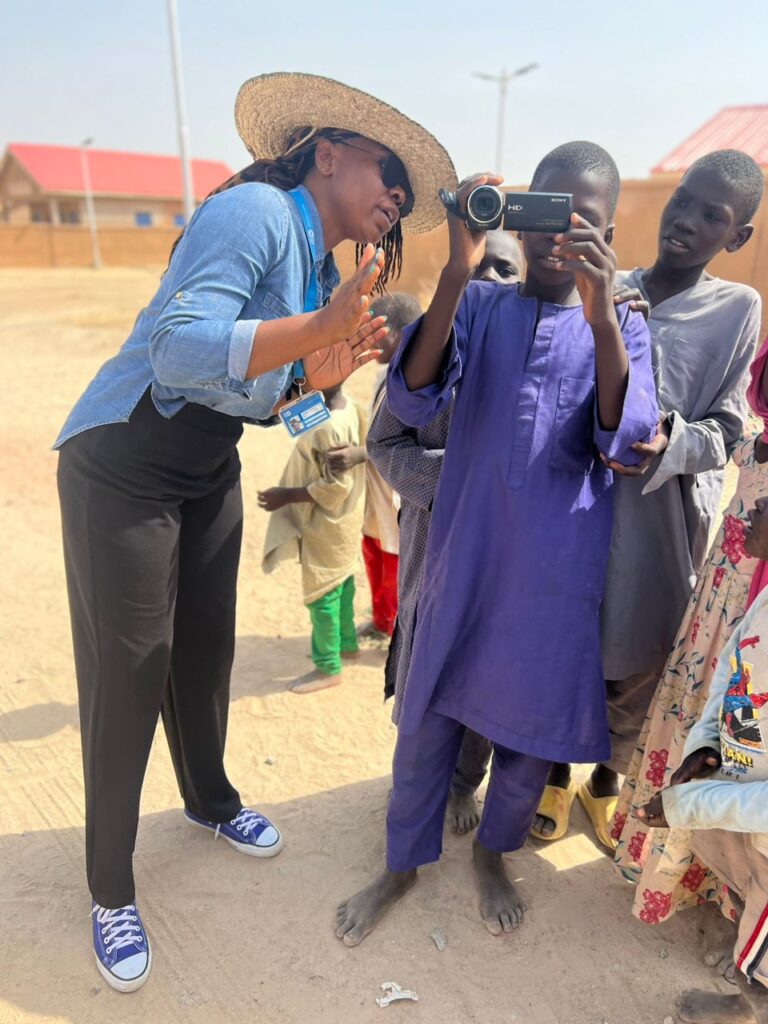
So it took me time. By the time the management knew that I could handle this, I broke through. Those were the initial challenges and combating them for me was saying to them, “Trust me, just give me this opportunity”, and anytime that I did that, I got the go ahead, the management never regretted the decision to give me a story to do, to ask me to pursue a story. It got to a point where, I was told this much later, much later, that the Chairman himself said that wherever there is conflict, whether in Nigeria or outside of Nigeria, I should be the one to go do it, and I think that’s a level of trust that I earned at that stage.
I couldn’t have gotten that if I wasn’t competent and diligent. If I wasn’t competent, if I failed in the assignment, I’m not sure they will be able to do that, and that always encourage me. That was the burning fire for me, these people have invested a lot of trust and I must deliver, I must tell the stories no matter what it takes, and I have this cameraman whom every time I got a mail” I will tell him Oh! we are going to this place”, I call him and tell him to pack up your bag, we are going to Zamfara, we are going to Kaduna, we are going to Niger, Kebbi, Sokoto and he will just pack his bag and we would laugh. He was such a companion because when we were in danger, we just had ourselves to talk to each other that we were going to come out of it. I think those were my initial struggles, but thankfully, I overcame them, and the light continues to shine.
Do you still have any current challenges you are trying to overcome?
I don’t think there are any challenges. I think I would love to go to more ‘dangerous’ areas, that’s one of the things I’ll love to do, not just in Nigeria but to go to other places. I’m inspired by women journalists who are doing so much, Clarissa Ward, Fanny Facsar my colleague who has been covering Ukraine and of course, other male colleague. These are people who inspire me and I feel at this point in my life, I wish that I’m able to tell more of the stories. I would not say that is a challenge because I understand how it works in D.W.. Security is a big one for D.W., sometimes, it’s not because they don’t trust your ability, we have to discuss with the team security details.
What are some of the barriers you think have prevented you from hitting the career target you set for yourself?
I think particularly, sometimes, telling stories in Nigeria is not easy especially if you mean to do this business. I have come very close to death, I have had the experiences of threats from state actors and non-state actors. Sometimes you will just want to take a step back and re-strategise and analyse what are the risks you will face and what are the plan Bs or exit options. For me, I think that’s the difficulty and I’m grateful and thankful to God that I am a global journalist, an international journalist, I don’t just work in Nigeria, I am grateful for that, it allows me the opportunity to explore and move my talents beyond our boarders and go to other places.
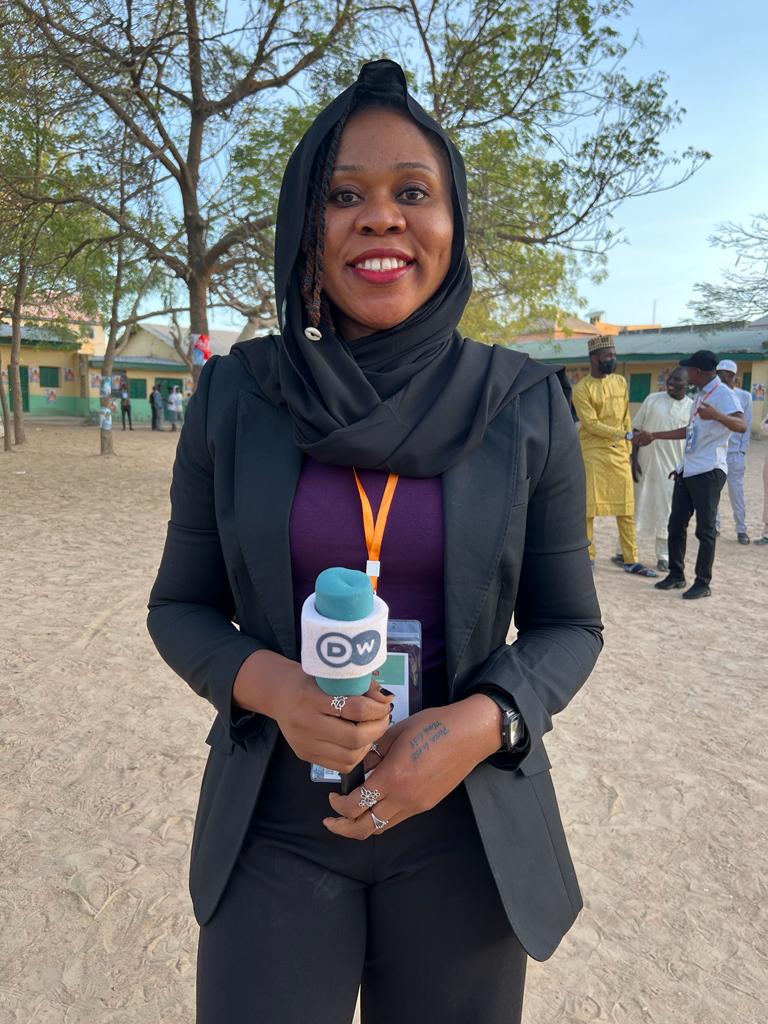
Why do you think is it important to overcome these seeming barriers?
I think the mindset is always the first, and it is always looking for opportunities and ways. For me, if I ask to do this, and you say no, I will ask what next can be done, and while you say no, I will be looking for other ways to do that, maybe not for the organisation, I could do the work as a journalist and the good thing our work has done for us is that we all have our platforms. There are many times I have pitched stories and I find ways to tell those stories and then put them on my website or I put them on my social media or share them anywhere.
For instance, today is the day for elder care and I have pitched that story but the time was too short, I planned to do it next year. But in the interim, I have used the liberty to write about my grandmother who is 104, whom I am documenting and I have interviewed her on several occasions, I used the opportunity to talk about her and to create awareness for elder care and to combat elder abuse. So these are the ways. I always say to myself that there is always a way out. I got that line from a book I read, I think in the early 2000s, 2004 or thereabout, “The Power of positive thinking”, written by Vincent Peale, and he always said that ” There is always a way out”, every time I said that to myself, it works like magic because there will be a way out, my mind is sound, I’m prepared to seek for those ways and look for every way possible to do it. I think that it is what I will charge journalists to do, always say to yourself, “It is possible”. It’s achievable and you can do it, it’s not cliche, it is true and it happens. Your mind works that way, whatever you feed your mind with, it begins to work on it, and you will see the result. In my own opinion, that’s what I believe in and that’s what has always worked for me.
What are some of the projects or stories that you have done that were the most impactful in the course of your career?
There are so many, but I think I want to talk about my story in Chibok, when I met Mariam Ali Maiyanga. Mariam was one of those that escaped and she returned with a child from Boko Haram, she was dealing with stigma, not being able to get her life back. So when I had the opportunity to go back to Chibok, she was one of the three girls I interviewed, of those who came back. She said to me if she can stay in touch and six months later, she sent a message to me, “I’m going back to school and I want to be a journalist. The reason I want to be a journalist is to be able to tell our stories”, and today as we speak, she is in American University of Nigeria, the one in Yola, the one by his excellency, former vice-president of Nigeria, Atiku Abubakar and she is doing practicable journalism.
She handles the camera, I see her Tiktok and I see someone who did not let her light to quench. If we didn’t go to Chibok that day, if we didn’t interview her, maybe her spark might not be ignited. I am so proud of her because much of how I will love to tell stories, there is no how I will be able to tell that story better than someone who had lived and had a child for terrorist, coming to the society and dealing with stigmatization, yet picked up her life and went back to school. I think that is very powerful, and she has not only gone back to school, but she has also enrolled her son, Aliyu and he is also going to school because she said that she wants Aliyu to have a better life than her. I think that is one of the most powerful stories.
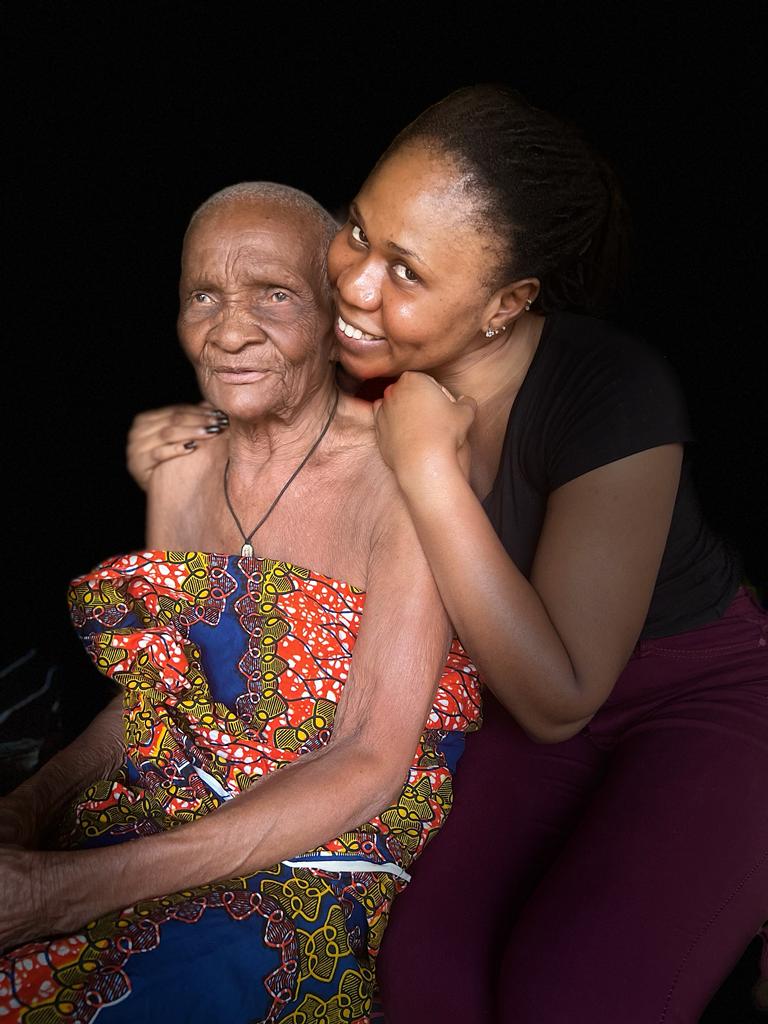
Amaka poses with her 104-years-old gorgeous grandma, Madame Mary Ucheboh.
Okoyé: “I told stories that were not money attached and that was why I made it clear when I came to Arise that I was not interested in covering events, it was not my thing, it was boring, as well as reading the news. I have great respect for anchors, the world will not hear the news if they are not there, but that’s not particularly my thing.”

Amaka: “The very first time I worked in Nigeria, I think it was the bureaucracy, it didn’t make sense to me when I came in, it was the fact that you had to fight a lot of demons to be able to tell a very good story, that was awkward for me.“
Another is Miracle who was in the slum of Ajegunle and his parent, his mom couldn’t afford his fees. There was this open library, the library is still functional, someone called Grace Nkwocha, opened the library, and it is a free library where children go there to read and learn. Miracle will go hawk bananas, then come back in the evening to visit the library. When I heard of the story, it touched me, I pitched the story and gratefully, D.W wanted the story because we also wanted to be intentionally telling beautiful stories and the right stories and don’t allow the good stories to fall on the way, because the media most times are so interested in telling the bad stories. So I pitched the story and D.W. was very happy with the angle, then I and the team, we followed this guy literally as he hawks, he hawks for 17 kilometres, and we told his story. Two months after this story was published, this boy got a scholarship from America, Canada, and not just the boy, they also donated to the school. I think he is being placed on monthly stipends. And someone also reached out to me from Canada, so when they reached out to me, I linked them directly to his family.
Then another one is Ayo, who was wrongly accused and was sentenced to death, he works in the military at the time he was sentenced to death, but thankfully, he got ten years through the help of Anchor Heritage and Femi Falana (Senior Advocate of Nigeria) who was in charge of his case.
So, we went and told his story and through that, his daughter got a scholarship from someone in Canada and there was this group of lawyers who wanted to take up his case pro bono so that the Nigerian army will give him back his benefits.
There are just a lot of them and I think also, most recently, is going to the North and telling the stories of the abductions. I remember when I got a call from Aljazeera, wanting to speak to me about that and I was glad that the world is paying attention.
And another time, I got a call from the White House, a correspondent from the White House who wanted to speak with me about the abduction and I just feel that this is what we are supposed to do, to be able to bring the plight of the people to the fore, not because we want to exaggerate or we want to make our country look bad but to let the relevant quarters see and hear and above that, act upon it, and then we see results. I knew the “demons and the devils” I had to fight when I was covering abductions, I knew a lot of state governors who didn’t like me. There is still a clip on Arise when I was trying to go live and they were blocking me literally and I had to say to the woman, “Listen to me, I’m live”, despite all of that, I have fearlessly told those stories, let the world know what is happening and not just telling the stories but seeing the results. I think it was after our fierce report of that abduction that the state governors at some point when the abductees were released, they stop media persons to see them first. They would receive them and debrief them before allowing media in.

It was also during that time that there was the controversy of do you pay for ransom or you don’t pay for ransom and I speak to people who were there firsthand, and many told me, “We know that money has changed hands”, then I ask the state governor, ” Did you pay ransom”, and he looked at me and said “No we didn’t pay for ransom”, and then I have firsthand testimonies of not just one person, not two or three, and we played the videos on Arise.
I remember also that many people were saying that Arise is becoming the mouthpiece of these people, and people sent me messages, but then, it didn’t stop me because we needed to do the work and we needed also to get the people rightly informed, it is usually a dilemma, but I think we have to do what we have to do, with a lot of prudence and professionalism. So for me, I think these are the areas of impact, but these stood out for me.
These are such inspiring and positively provoking stories, Amaka. Now, let’s take a look at the career projection you are setting up for yourself and how you intend to meet up.
I think that I haven’t started. Currently, I am embarking on training that will take me away for some time, but the idea is to keep building and to also explore. You will agree with me that journalism is changing, not what we used to do, I am also pushing myself to change with the times and to remain relevant and to seek all the knowledge and skills that I need to be able to remain relevant and tell the stories in the changing dynamics of journalism today.
What training programmes or short courses have you attended, which you applied on the job that made the most impact on you?
I think that my major training was at Tangaza College, the Catholic University of East Africa where I got my first degree. For me, it’s core because everything was practical and beyond that, I’m an alumnus of the Reuters Foundation, so I did a lot of training on reporting, different reports on trafficking, illegality, migration etc. I have also done training, thanks to D.W. on safety which is very applicable now, hostile environment, and awareness training, that one is core and is key and I think that it is what every journalist should build themselves on.
I have also done the fellowship with Wole Soyinka Center for Investigative Journalism that opened me up to leadership and relevance, newsroom leadership and how to tell stories differently as women and the lenses we use. I also did a training with Young Africa Media as well, sometime last year. Like I said, I am also starting training out of our base and it is endless, I have also done a lot of short courses I don’t even remember to be honest.
Currently, I’m on the media innovation programme, sponsored by MTN, there are just so many things. I think the point is that we won’t lose sight of growth and opportunities to grow. Fellowships are great in my opinion and also just apply to different things, either to pitch stories to organisations or create content, share knowledge, and great courses. I have this free course that is up on my website www.amakaokoye.com, ” The Art of Story Telling”, that is accessible to all. For me, that is giving back, and also spreading the light. I think these are the training and capacity buildings that I’m engaging in.
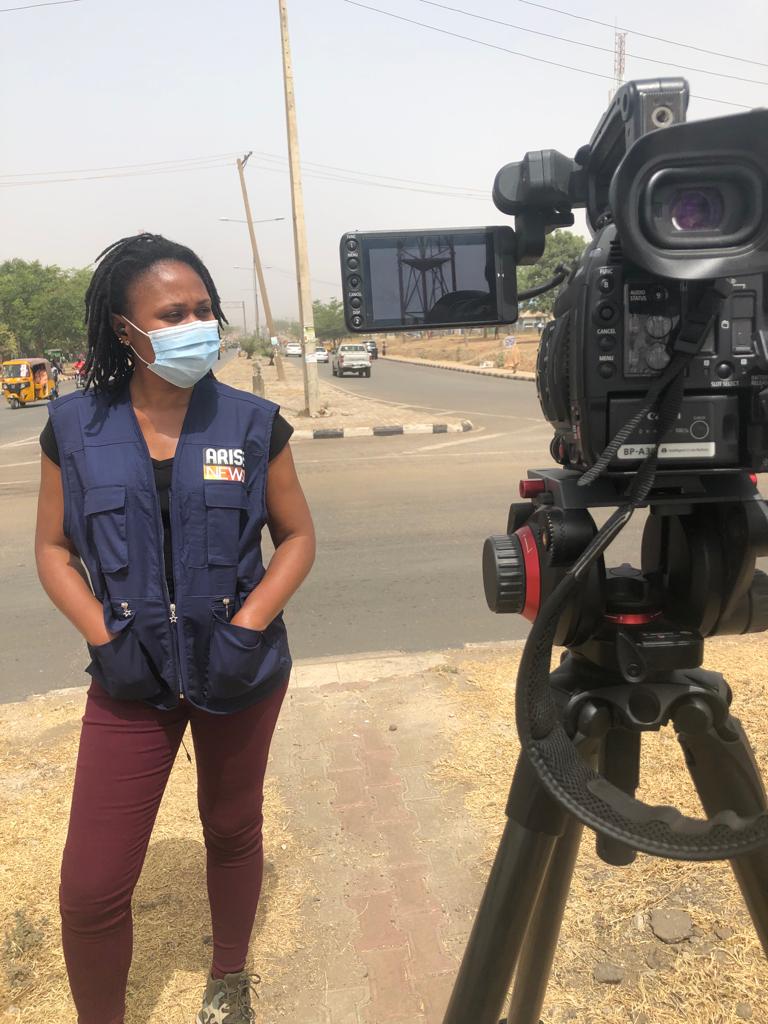
Okoyé covering the abduction of over 300 students 2020 while with Arise News, Nigeria.
“Sometimes, journalists should stage a walkout in solidarity when there is a need for that . . . I said to myself that I won’t become a hungry journalist.” – Amaka Okoye.

“My inner circles are my best cheerleaders, they are my support system, they do things so meaningful, sometimes, it is just a call, it is just a message, and that has always kept me.” -Okoye.
What suggestion will you give media owners to help boost morale and help reduce toxicity in the workplace?
First, there needs to be a lot of training on emotional intelligence in media organisations, in my opinion. There is a need for local media organisations to increase the salaries of journalists. It’s so sad when you see the way journalists are treated in Nigeria and I think it’s because they are not well paid. Sometimes, some stories I do see and I will ask myself “What is the essence of this story”, but they had to do it may be because they are paid a little stipend and I see people struggling to do certain stories, not because they desire or are passionate about it, but because of a few handouts. I wish and say that the culture of handouts will stop in the practice of journalism in this clan.
I’m grateful for where I am, as a matter of standard, you do not accept or attempt to. That’s why when we cover stories, we just finish and then we go home, I mean you have no business with anybody. Even before I got into the career, I said to myself that I won’t become a hungry journalist and I am also a deeply spiritual person, it’s my agreement with God, and somehow that has worked for me. Journalists must be comfortable, it’s not a luxury, and they need to be comfortable to do this job, I don’t know how else to express it but journalists should not be seen as haggard people. Journalists should be well paid, it should be a profession that people are envious of.
Journalists are not meant to struggle if they want to go on vacation, you don’t think twice, ” Oh my God! If I buy this ticket, I’m going to drink garri for the rest of the year”. They should be able to afford those things, it is not luxury, they need it and are entitled to it. Journalists work so hard. And also, I have been on mental health advocacy because of my personal experience, covering conflicts and their impact. I also think that part of the welfare package in media organisations should include mental car where journalists have access to therapy, they have access to psychologists, access to counselling, to just go away to rest, breathe and be healthy, give the opportunity to talk about their experiences, I think it’s an important provisional care to be made available.
How do you balance your personal life, work, family, and expectation? Which one has been the most challenging and how were you able to overcome them?
I think that I’m living my best life. One of the things I love about this work is that I love to travel and that’s why I am excited about having an international role that I get to travel as much. The challenge is that sometimes I miss a lot of family events and I’m a family person, I’m family oriented. I miss my two sisters’ wedding. I just have two sisters and I think I missed their weddings, the second one, I only attended the reception. I was lucky to attend my brother’s wedding but my two sisters’ weddings, I missed them, sometimes I forget my nephew’s birthdays and that’s like a shame. So I have a reminder, so I will say that I will try and call and sometimes, I don’t remember, and they will call and tell me that “You forgot my birthday”, I will have this horrible feeling. But I have a support system, I have really good friends, not so many of them but I have inner circles.
My inner circles are my best cheerleaders, they are my support system, they do things so meaningful, sometimes, it is just a call, it is just a message, and that has always kept me. I don’t think there is any part of my life that is lacking, I tend to put my relationship very private but I think I am where I’m supposed to be today, to be perfectly honest. I wish I could have time to enjoy more family, just travel home and go see my grandmother who is 104 years, or I could just walk to my sister’s house anytime to have the weekends. That’s very possible but it doesn’t happen often.
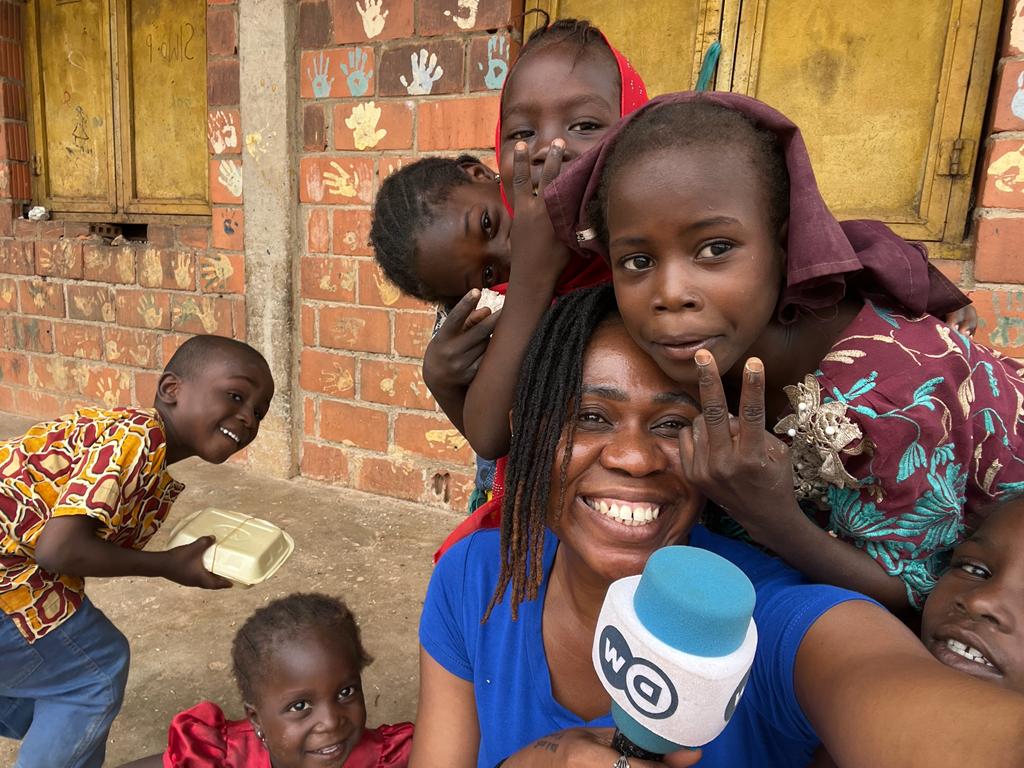
Is there anything about the media industry you will like to see change for the better?
I have mentioned that the media should pay journalists very well, especially those who work for local media, they should be paid. They should be well paid, it is not enough to say “But you are using my platform”. No! pay journalists their due money and treat them well.
I will like to see journalists have a firm stand on issues and sometimes, make a statement. Do not accord certain people (politicians especially) the respect they are undeserving of and give them a platform to spill garbage. Sometimes, journalists should stage a walkout in solidarity when there is a need for that.
In the next three to five years, where do you see yourself?
In the next three to five years, I see myself in a different completely news space, I’m working towards that, still in journalism but will be in a different aspect of it. But really, I will be better, stronger, and achieve more than where I am now.
What are your current role and responsibilities you handle?
I work as a West African Correspondent for Deutsche Welle here in Nigeria. The role means that I cover stories within the region of West Africa in the continent and it’s quite exciting because it offers me the opportunity to travel, explore experiences, new people, and new cultures, tell stories and report on the ground, I file reports for different departments.
D.W. is not just for news gathering, we do stories for News Africa, and we do for the radio as well as for social media. So it is all-encompassing and quite exciting. As well, I work with incredible colleagues here in Nigeria, we have time to collaborate with others, with our colleagues in Berlin, and also I stay in touch with our colleagues in Ukraine, particularly because I love what they do. I am also in touch with Fanny Facsar, Nick Conoly, guys who are doing fantastic work, they have been there from the beginning of crises, and wars in Ukraine.
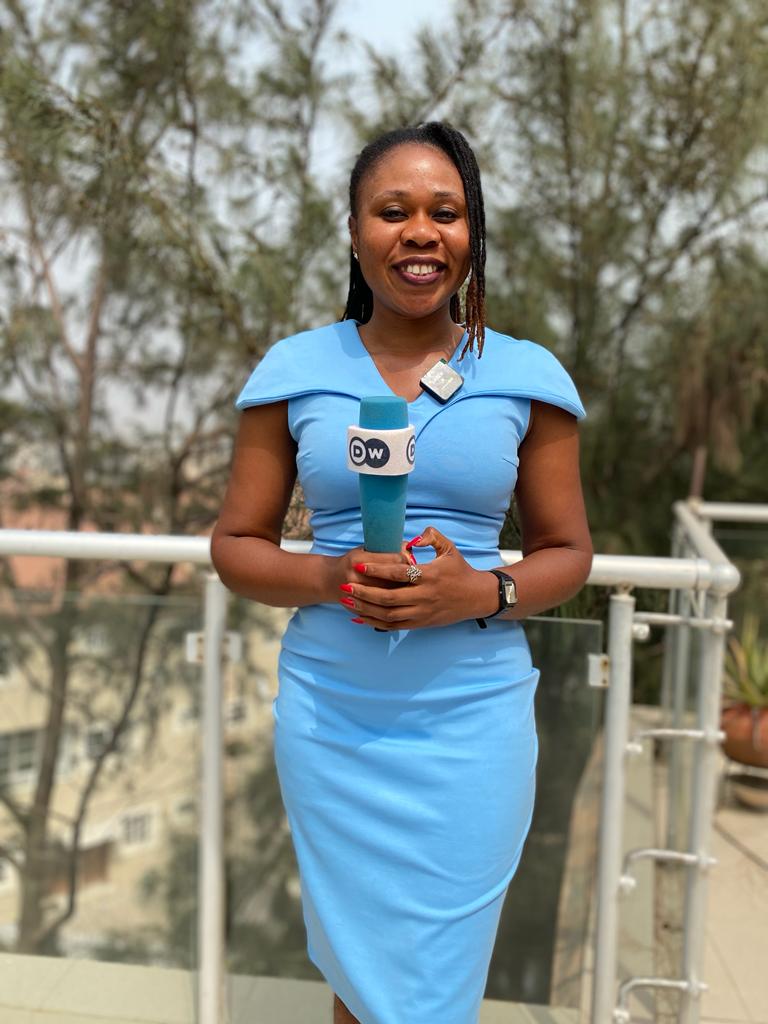
How do you think the Nigerian media can up its ante to also compete more favourably with international media organisations?
Training, intentionality in capacity building, invest in media organisations, invest in your journalists and also allow journalists to empower themselves and don’t feel threatened when they say “I have to go and up-skill”, allow them when they do, they make you better.
Written by ERU.






Comments